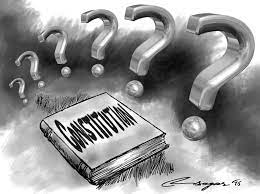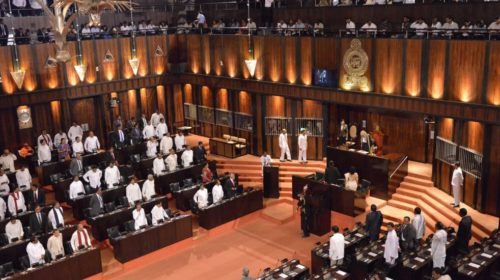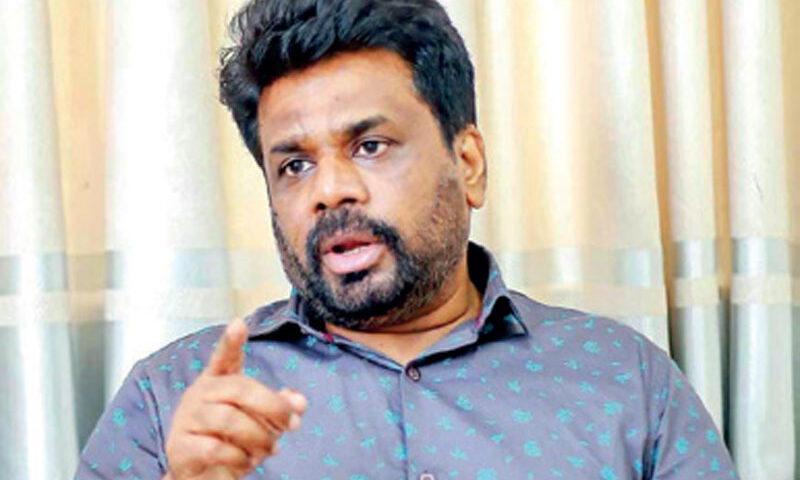Beware: The third readymade Constitution is coming
(Basil Fernando – The Morning 4th Nov)
 Foreign Affairs Minister Prof. G.L. Peiris has announced that the drafting process of the Constitution is over and that now, the text is ready. He further said that it is expected that in January next year, it would be presented to the Parliament. President Gotabaya Rajpaksa also, in a televised speech, referred to the Constitution being made within the course of next year.
Foreign Affairs Minister Prof. G.L. Peiris has announced that the drafting process of the Constitution is over and that now, the text is ready. He further said that it is expected that in January next year, it would be presented to the Parliament. President Gotabaya Rajpaksa also, in a televised speech, referred to the Constitution being made within the course of next year.
This should be alarming news for all citizens who are concerned about their own lives and their Constitutional rights. Under the Constitution, the people are sovereign. It is the sovereign people who have the right to give themselves the Constitution. The process as envisaged by Prof. Peiris and this Government completely violates the best principles of making the Constitution and also violates the notion of the sovereignty of the people.
The consequences of the proposed process is that it would have a disastrous effect on the state, all public institutions including the public financial institutions and the entire fabric of the society in the future. This Constitution that is envisaged will not only bind the present generation but it would have an enormously adverse impact on the future generations.
The people need to intervene to stop this proposed process and insist on their rights as citizens to participate in this process and in order to bring into the Constitution the matters that they think are of vital importance to their nation as well as to each of the members of that nation who have everything at stake in the manner in which the Constitution provides for their protection and functioning in the future.
 Constitutions are not made for the enslavement of the people and to trap them under various kinds of designs and formulas, by which, things that are harmful to the nation and to the people could be achieved. The struggle against the proposed process should be a struggle to prevent a serious future harm to the nation.
Constitutions are not made for the enslavement of the people and to trap them under various kinds of designs and formulas, by which, things that are harmful to the nation and to the people could be achieved. The struggle against the proposed process should be a struggle to prevent a serious future harm to the nation.
Constitutions are not made as some kind of abstract document that could be designed by constitutional pundits. There are a few people who have designs of their own for how to exploit the national resources for their own benefits and not for the benefit of the nation. Constitutions are made to address the most pressing problems of the times in which such Constitutions are made so that a legal framework would be developed within which the future relationship within the nation could take place for the benefit of everyone within the nation. For this reason, everyone has a right to their say in the making of their Constitution.
By now, twice, people have been cheated in the process of the making of the Constitution. The first was in 1972 when a Constitution was promulgated which undermined the independence of all public institutions in favour of politicians directly running the basic institutions of the country. That Constitution also started the process of undermining the independence of the Judiciary.
The second most disastrous Constitution was the 1978 Constitution, which has been condemned by everybody, including by the leading politicians who came to power at different times, but which became a noose on the neck of the people who wanted to participate in the political and social processes to bring about the wellbeing of everybody. All the present disasters that are faced by the nation and which are known to everyone can be traced to these two Constitutions.
It was unfortunate that these two Constitutions were passed without strong resistance from the people. Perhaps the people did not yet understand what kind of political, economic and social disasters could be brought about by Constitutional processes which undermine the rights of the people rather than enhancing their rights. The present situation provides an opportunity for interventions in order for people to ensure that what they want is included in the Constitution.
What would the people want to include in the Constitution? In fact, this can be easily identified in terms of the disasters that the country is faced with now. It seems that these kinds of disasters could be prevented through proper legal frameworks in the future. Some of these major problems could be mentioned as follows.
Prevent the abuse of national finances
A proper process of dealing with national finance should be incorporated into the Constitution so that the kind of economic malevolence that now exists will not be repeated in the future. The US dollar crisis clearly shows that there were no adequate Constitutional safeguards for the seeking of loans and also about the ways of monitoring such monies obtained through such loans.
Regulating such loans received and processed is an essential element for the protection of Sri Lanka as a nation and also particularly of younger generations of Sri Lanka’s future. The provisions that have been made so far in the existing Constitution have proved inadequate to create the necessary facilities and limitations for the proper functioning of national institutions which are dealing with the control of finances in the country.
Constitutions should provide a necessary framework for creating a functional corruption control mechanism. The existing laws as well as enforcement means, for the control of corruption, have proved enormously disadvantageous to the nation. Corruption is more rampant than ever before.
Mere assurances given by the President or anybody else will not change that situation. There should be a Constitutional means to ensure the development of a functioning system which could bring about the stability that is required to attract investments and also at the same time, safeguard the interests of the nation.
Ensure the proper control of international agreements
The Constitution must clearly provide a process to control international agreements that have been made in order to facilitate the possibility of bringing about a healthy environment for foreign investments.
These processes of the making of agreements should be transparent to an extent that the people could intervene to prevent the abuse of these processes and also all sorts of obtaining of commissions and other things of an illegal nature in entering into these agreements. Above all, the Constitution must ensure that nothing threatening the sovereignty and the territorial integrity of the nation could be brought about by entering into agreements which will have long term consequences on the sovereignty of the nation.
Ensure the protection of national resources
The protection of Sri Lanka’s national resources and the environment should find a clear provision within the Constitution so that the new laws and the law enforcement systems can be developed to ensure such protection. For example, today, there is a threat to the control of the sea around Sri Lanka. Fisherfolk in Sri Lanka are threatened by the intrusion of others who virtually steal the local fishing resources and thereby threaten the livelihood of the fisher folk.
Similarly, the environment is threatened throughout the country by the improper allocation of land, purportedly for development purposes but which is creating environmental disasters everywhere including concerning Sri Lanka’s water resources. All these problems which are associated with the protection of Sri Lankan resources and the environment should receive priority on the point of view of the development of an overarching framework of proper regulation on all matters concerned with this.
Protect agriculture and the people’s ownership of land and other resources
One of the most urgent issues that people are faced with is the agricultural environment in Sri Lanka. The authorities including the Government should be prevented from taking ad hoc decisions which bring about untold misery to the lives of the people. Some of these miseries are the breakdown of the agricultural sector which has already led to widespread malnutrition and which could lead to situations of starvation.
The problems of the farmers and the improvement of their livelihood and stability within the framework of the law should be the basis of the modernisation of agriculture as well as the introduction of new technologies into the agricultural sector. If these things are done without the proper legal protection mechanism, all these things could cause a severe catastrophe which will affect not only the farmers but also the whole nation.
Associated in the areas of regulating the agricultural setup is the control of the monopolies that take undue advantage of the agricultural produce. The supreme law of the country should have provisions to provide a proper regulatory system within which competing parties could take part within an acceptable framework where all parties share the benefits of the agricultural products and the sales.
A Constitution must provide an overarching legal framework within which national policies could be developed in order to achieve the overarching goals that the Constitution is created for. Thus, such frameworks should be created into the issues relating to exports and imports and all other matters relating to commerce so that arbitrary exploitation could be prevented. And this cannot be done purely through the existing commercial laws.
Ensure the creation of a functional system for the administration of justice
Above all things, a country requires a functional system for the administration of justice. There is acknowledgement that the existing framework has been purposefully undermined in order to make unprincipled forms of exploitation possible. The country’s criminal justice system is at the lowest ebb now.
In a similar way, the country’s prosecution system has suffered severe setbacks and lost the confidence of the people. The judicial role, judicial function and judicial independence have been undermined. These are all matters that have not been dealt with adequately in the Constitution. Therefore, the Constitution making process taking place now should pave the way for these matters.
Ensure media freedom and prevent repression
In terms of media freedom, the situation prevailing in the country at the moment is dangerously inadequate. This situation is a reflection that the existing Constitutional provisions for the protection of the freedoms of expression, association or assembly are inadequate.
Therefore, the Constitution must deliberately go into addressing the methods by which the wrongs done at previous times could be prevented from recurring. The killing of journalists and having no inquiries into these matters remain and also other forms of punishments to journalists like the breaking of the legs of one of the journalists and many other forms also remain major problems in Sri Lanka, and the Constitution must therefore provide for, if the Constitution is to have any meaning, to prevent these situations.
Hold politicians accountable
Holding politicians accountable is one of the major themes that people are discussing all the time. Thus, if the people have a say in the making of a Constitution, they would want to see that this matter is dealt with properly within the framework of the Constitution. All the possibility of corruption by politicians requires a preventive mechanism, and for that, the principles that should be followed must be articulated within a clear framework within the Constitution.
Firmly entrench judicial power and judicial independence
For all these to be of any meaning, the judicial role, the judicial function and judicial independence should be rescued from the severe undermining it has suffered during the operation of the last two Constitutions.
Resurrecting of the judicial role, the judicial function and judicial independence is at the core of any kind of legally based society. The Constitution is supposed to create the framework for such a legally based society. Therefore, it should be well within the framework of the Constitution to review the failures of the past and to find ways to correct these matters.
This list is not exhaustive
Many more other aspects can be added to the list in terms of the experiences of others such as trade unionists, prisoners, children, differently abled persons, women, and the future, particularly of the law enforcement sections of the country.
Prevent the fusion of civilian and military functions
The Constitution must clearly state the civilian character of the state. Any attempt to create a fusion of the civilian and military complex as a state will be the rejection of all the fundamentals on which the legal system and the Constitutional system has been based on, in the past.
It is most likely that the Constitution proposed now is going in the direction of making a fusion between the civilian character of the state and the military character. This would have a disastrous impact on every aspect including international relations and the future of Sri Lanka.
The protection for the Sri Lankans employed overseas through express recognition in the articulating of the principles of protection for the people means that such an overarching framework should provide for the institutional protection of the future of these workers.
Of paramount importance is the manner in which the issues of minorities are dealt with within the framework of the Constitution in such a manner that all people live in harmony as equal citizens, enjoying equal rights and equal protections, while at the same time enjoying the recognition of their differences within the framework of a democratic state.
It is not enough to say these things as generalisations but a proper legal framework should be articulated within which one of the major problems facing the country for a long time could lead to a better resolution.
The people need to intervene now to stop the Government from proceeding with the passing of the proposed readymade Constitution. They must demand the right to participate in making a Constitution that they can call their own.
(The writer is the Asian Human Rights Commission’s Policy and Programmes Director)
The views and opinions expressed in this column are those of the author, and do not necessarily reflect those of this publication.



